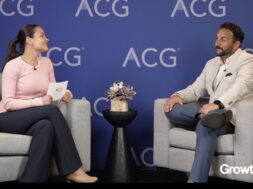A Down Economy Can Be Ripe for Investment Opportunity
How EGI approaches investing in a challenging market environment

As we enter 2023 and the market continues to indicate an economic downturn, most investors are preparing for a rocky road ahead and focused on managing risk. Some alternative investors, however, see times of volatility and uncertainty as opportunities to acquire and invest in companies with significant value creation potential.
At Equity Group Investments (EGI), we are flexible and opportunistic with a primary focus on direct private investment opportunities. Today, we leverage our decades of experience to maximize the potential of our portfolio companies in a number of ways, including through financial restructurings, operational turnarounds and sometimes, a combination of both.
In a rapidly changing economic climate like this, there are several ways to approach investing, from distressed to complex. There are many questions we ask ourselves when considering which opportunities to actually pursue, including:
- Is this company in an industry with a negative secular trend? We are long-term holders, so we examine broader industry trends. We stay away from industries that are in decline or rapidly changing—for example, traditional retail.
- How stable is the customer base? We find it particularly important to assess customer concentration and stability, and we want to ensure the customer base remains as intact as possible. If one customer makes up 60% of the customer base, and that customer takes its business elsewhere, it could negatively impact the investment.
- How much control will we have throughout the process? We must be decisive and bring a clear strategy and action plan to stabilize the business quickly, particularly in an operational turnaround. It is paramount that we have autonomy to act in the best interest of the business.
Improving Business Strategies and Operating Capabilities to Create Growth Platforms
Operational turnarounds can be time- and labor-intensive but, with patience and expertise, can offer tremendous upside through ongoing value creation, and can often pave the way for successful financial restructurings.
EGI took this approach with a moving and relocation company that had been negatively impacted by its exposure to the housing market crash that preceded the Great Recession of 2008. The company held a sizable portfolio of unsold single-family homes it had acquired as part of its relocation services. In addition, prior management had failed to fully integrate asset acquisitions of two moving companies and six relocation businesses as part of a rollup strategy.
As the economic environment put significant pressure on the company’s ability to generate cash, and as the value of unsold single-family homes declined on the balance sheet, the company was forced to restructure its substantial debt burden through a bankruptcy process.
Related content: Crest of a Wave: The Distressed Investing Opportunity
EGI became one of two primary owners following the company’s emergence from Chapter 11 in 2008, which created the opportunity to change management and implement a full operational turnaround. We came into the investment with an immediate-term action plan to stabilize business operations and shore up the capital structure.
Within two years of ownership, EGI significantly de-risked the business by monetizing the portfolio of homes, integrating the moving and relocation businesses to eliminate operating redundancies, extracting costs, and refinancing the company’s balance sheet. EGI also worked with management to expand the company’s business both domestically and into Europe, which enabled the company to grow its market share for the first time in 10 years.
By implementing discipline around the operations and balance sheet, the company’s EBITDA grew from breakeven to 17% of its revenue when EGI exited a decade later—demonstrating the waves of value creation and growth that can be generated by a highly engaged and flexible long-term partner.
Complex Capital Solutions
We often see companies with attractive business models and solid business fundamentals that have problems with their capital structure due to a burdensome debt load, regularly exacerbated by industry dynamics and economic cycles. These companies may also be facing an acute need for creative capital, especially if other financing sources have retreated.
One case study of this approach is EGI’s investment in a family-owned shipping and logistics company that principally serves the US West Coast and Hawaii trade lane. In response to regulations, the company endeavored to build two ships, which required significant capital. The financing had to be secured within 30 days.
Related content: Where M&A Opportunities Lie: Baby Boomers, Infrastructure and Independent Sponsors
Under this tight deadline, EGI provided an optimal solution by capitalizing a joint venture solely for the purpose of building the new container ships. This approach resolved the company’s capital structure issues while providing EGI an entry point to become a partner and investor in the business. Today, EGI continues to support the family and management team with ongoing initiatives.
It is critical that investors prepare, take a long-term view of a business and provide companies with the resources and planning they need now, while at the same time thinking ahead about what the growth opportunities and partnership can look like on the other side.
A Long-Term View can Increase and Accelerate Turnaround Effectiveness
The potential impending market downturn, even if mild, could last longer and look different than what we’ve seen before as a result of ongoing inflation challenges, rising interest rates and a tight labor market. Many companies may be hamstrung for liquidity and may be anticipating a period of either slow or no growth.
In this type of macroeconomic environment, it is critical that investors prepare, take a long-term view of a business and provide companies with the resources and planning they need now, while at the same time thinking ahead about what the growth opportunities and partnership can look like on the other side.
Mark Sotir is president of Equity Group Investments (EGI), where he oversees the firm’s investment activity and focuses on optimizing Sam Zell’s network. He applies his 20+ years of CEO and board experience to help portfolio companies improve business strategies and operating capabilities. In addition, Mark is vice president of Chai Trust Company, LLC, the corporate trustee for the Zell family trusts. He also serves as board chair for Able Freight Services, Ardent Health Services, East Coast Warehouse & Distribution, Lanter Delivery Systems and Paper Transport.
Mark joined EGI in 2006 as a managing director and has held temporary in-house assignments within EGI portfolio companies to accelerate and increase the effectiveness of turnarounds. Prior to joining EGI, Mark was the chief executive officer of Sunburst Technology Corporation and on the company’s board of directors. He also served as the president of Budget Group, Inc. (Budget Rent A Car and Ryder Truck Rental) and was on the company’s board. Earlier in his career, Mark worked at The Coca-Cola Company in senior brand management and sales roles. Mark holds an MBA from Harvard Business School and a BA from Amherst College.
Equity Group Investments (EGI) is a private investment firm founded more than 50 years ago by Sam Zell. Backed by private capital, we are flexible and opportunistic with a primary focus on direct private investment opportunities, but we have the in-house expertise to invest across the capital structure. As long-term investors, EGI actively partners with portfolio company executives to execute strategic planning, implement operational efficiencies and scale businesses. We have grown companies across numerous industries into multi-billion-dollar businesses throughout economic cycles. And today, we continue to leverage our decades of experience to maximize the potential of our portfolio companies a number of ways, including through financial restructurings, operational turnarounds and sometimes a combination of both.
Disclaimer: For informational purposes only. Content should not be relied upon for investment decision making and is not to be construed as legal, business or financial advice.


